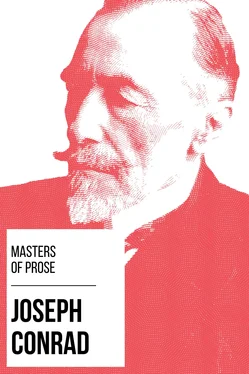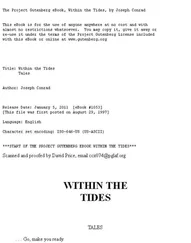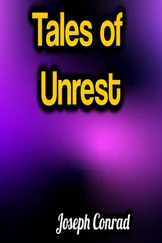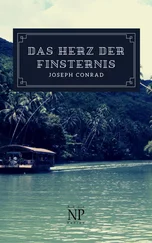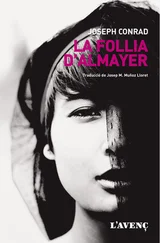What he did was to come down all the way from Ukraine to have it out with me and to judge by himself, unprejudiced, impartial, and just, taking his stand on the ground of wisdom and affection. As far as is possible for a boy whose power of expression is still unformed I opened the secret of my thoughts to him, and he in return allowed me a glimpse into his mind and heart; the first glimpse of an inexhaustible and noble treasure of clear thought and warm feeling, which through life was to be mine to draw upon with a never-deceived love and confidence. Practically, after several exhaustive conversations, he concluded that he would not have me later on reproach him for having spoiled my life by an unconditional opposition. But I must take time for serious reflection. And I must think not only of myself but of others; weigh the claims of affection and conscience against my own sincerity of purpose. “Think well what it all means in the larger issues—my boy,” he exhorted me, finally, with special friendliness. “And meantime try to get the best place you can at the yearly examinations.”
The scholastic year came to an end. I took a fairly good place at the exams, which for me (for certain reasons) happened to be a more difficult task than for other boys. In that respect I could enter with a good conscience upon that holiday which was like a long visit pour prendre conge of the mainland of old Europe I was to see so little of for the next four-and-twenty years. Such, however, was not the avowed purpose of that tour. It was rather, I suspect, planned in order to distract and occupy my thoughts in other directions. Nothing had been said for months of my going to sea. But my attachment to my young tutor and his influence over me were so well known that he must have received a confidential mission to talk me out of my romantic folly. It was an excellently appropriate arrangement, as neither he nor I had ever had a single glimpse of the sea in our lives. That was to come by and by for both of us in Venice, from the outer shore of Lido. Meantime he had taken his mission to heart so well that I began to feel crushed before we reached Zurich. He argued in railway trains, in lake steamboats, he had argued away for me the obligatory sunrise on the Righi, by Jove! Of his devotion to his unworthy pupil there can be no doubt. He had proved it already by two years of unremitting and arduous care. I could not hate him. But he had been crushing me slowly, and when he started to argue on the top of the Furca Pass he was perhaps nearer a success than either he or I imagined. I listened to him in despairing silence, feeling that ghostly, unrealized, and desired sea of my dreams escape from the unnerved grip of my will.
The enthusiastic old Englishman had passed—and the argument went on. What reward could I expect from such a life at the end of my years, either in ambition, honour, or conscience? An unanswerable question. But I felt no longer crushed. Then our eyes met and a genuine emotion was visible in his as well as in mine. The end came all at once. He picked up the knapsack suddenly and got onto his feet.
“You are an incorrigible, hopeless Don Quixote. That's what you are.”
I was surprised. I was only fifteen and did not know what he meant exactly. But I felt vaguely flattered at the name of the immortal knight turning up in connection with my own folly, as some people would call it to my face. Alas! I don't think there was anything to be proud of. Mine was not the stuff of protectors of forlorn damsels, the redressers of this world's wrong are made of; and my tutor was the man to know that best. Therein, in his indignation, he was superior to the barber and the priest when he flung at me an honoured name like a reproach.
I walked behind him for full five minutes; then without looking back he stopped. The shadows of distant peaks were lengthening over the Furca Pass. When I came up to him he turned to me and in full view of the Finster Aarhorn, with his band of giant brothers rearing their monstrous heads against a brilliant sky, put his hand on my shoulder affectionately.
“Well! That's enough. We will have no more of it.”
And indeed there was no more question of my mysterious vocation between us. There was to be no more question of it at all, no where or with any one. We began the descent of the Furca Pass conversing merrily.
Eleven years later, month for month, I stood on Tower Hill on the steps of the St. Katherine's Dockhouse, a master in the British Merchant Service. But the man who put his hand on my shoulder at the top of the Furca Pass was no longer living.
That very year of our travels he took his degree of the Philosophical Faculty—and only then his true vocation declared itself. Obedient to the call, he entered at once upon the four-year course of the Medical Schools. A day came when, on the deck of a ship moored in Calcutta, I opened a letter telling me of the end of an enviable existence. He had made for himself a practice in some obscure little town of Austrian Galicia. And the letter went on to tell me how all the bereaved poor of the district, Christians and Jews alike, had mobbed the good doctor's coffin with sobs and lamentations at the very gate of the cemetery.
How short his years and how clear his vision! What greater reward in ambition, honour, and conscience could he have hoped to win for himself when, on the top of the Furca Pass, he bade me look well to the end of my opening life?
The devouring in a dismal forest of a luckless Lithuanian dog by my granduncle Nicholas B. in company of two other military and famished scarecrows, symbolized, to my childish imagination, the whole horror of the retreat from Moscow, and the immorality of a conqueror's ambition. An extreme distaste for that objectionable episode has tinged the views I hold as to the character and achievements of Napoleon the Great. I need not say that these are unfavourable. It was morally reprehensible for that great captain to induce a simple-minded Polish gentleman to eat dog by raising in his breast a false hope of national independence. It has been the fate of that credulous nation to starve for upward of a hundred years on a diet of false hopes and—well—dog. It is, when one thinks of it, a singularly poisonous regimen. Some pride in the national constitution which has survived a long course of such dishes is really excusable.
But enough of generalizing. Returning to particulars, Mr. Nicholas B. confided to his sister-in-law (my grandmother) in his misanthropically laconic manner that this supper in the woods had been nearly “the death of him.” This is not surprising. What surprises me is that the story was ever heard of; for granduncle Nicholas differed in this from the generality of military men of Napoleon's time (and perhaps of all time) that he did not like to talk of his campaigns, which began at Friedland and ended some wherein the neighbourhood of Bar-le-Duc. His admiration of the great Emperor was unreserved in everything but expression. Like the religion of earnest men, it was too profound a sentiment to be displayed before a world of little faith. Apart from that he seemed as completely devoid of military anecdotes as though he had hardly ever seen a soldier in his life. Proud of his decorations earned before he was twenty-five, he refused to wear the ribbons at the buttonhole in the manner practised to this day in Europe and even was unwilling to display the insignia on festive occasions, as though he wished to conceal them in the fear of appearing boastful.
“It is enough that I have them,” he used to mutter. In the course of thirty years they were seen on his breast only twice—at an auspicious marriage in the family and at the funeral of an old friend. That the wedding which was thus honoured was not the wedding of my mother I learned only late in life, too late to bear a grudge against Mr. Nicholas B., who made amends at my birth by a long letter of congratulation containing the following prophecy: “He will see better times.” Even in his embittered heart there lived a hope. But he was not a true prophet.
Читать дальше
